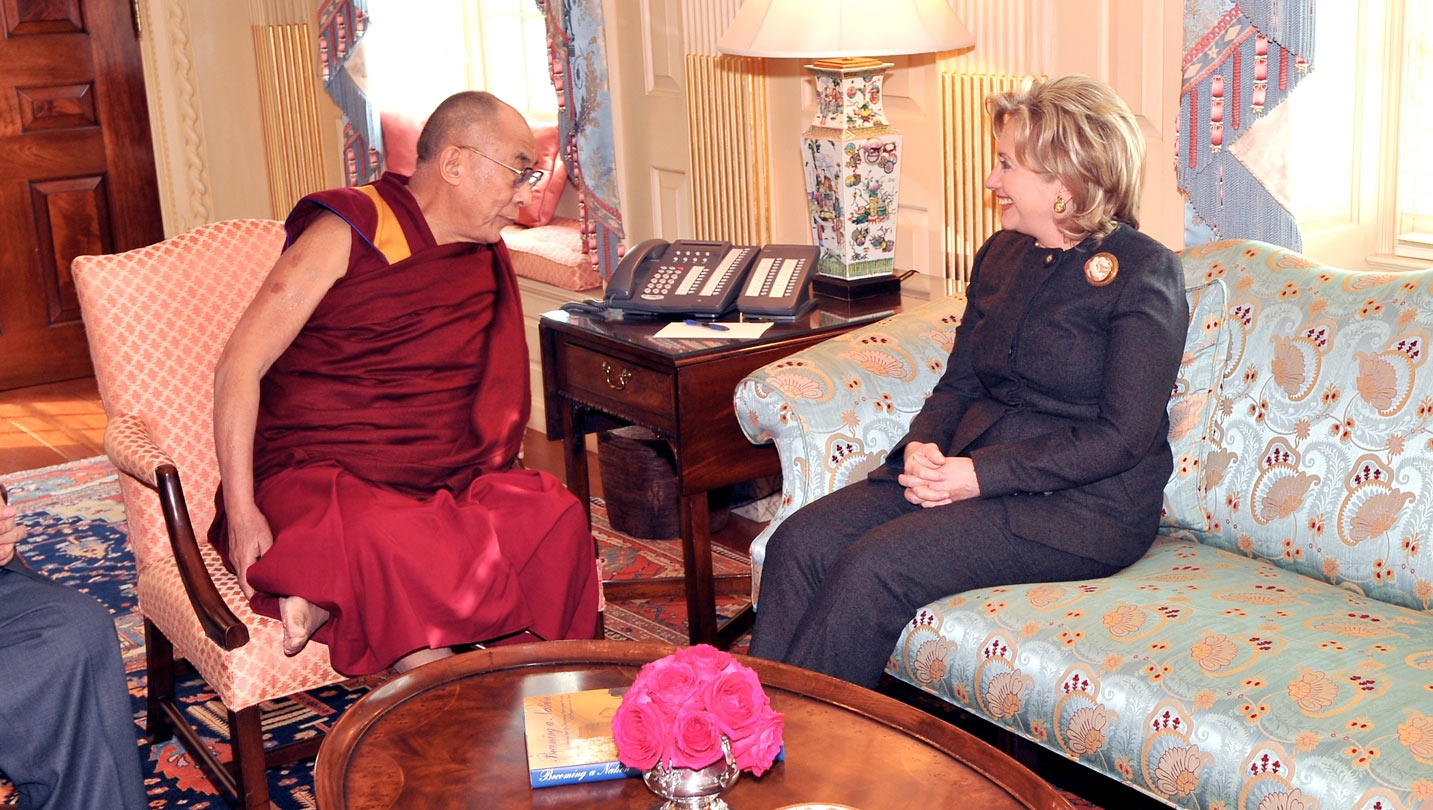
Then Secretary Hillary Clinton receiving the Dalai Lama at the State Department in February 2010. (Photo: Michael Gross, State Department)
Tibetan Americans and friends and supporters of the Tibetan people are watching the developments closely. In past elections, Tibetan Americans have shown themselves to be single-issue voters; with Party affiliations being regarded secondary to how the candidate has shown his (and now her) support to Tibet. During President George W. Bush’s re-election in 2004, quite many Tibetan Americans said they voted for him even though they identified themselves as being Democrat. This was because President George W. Bush clearly spoke out in support of the Dalai Lama and Tibet.
American politicians have noted this small but influential voting constituency. During the 2008 elections, Republic presidential candidate John McCain paid a special trip to Aspen to meet with the Dalai Lama, who was on a visit there. Not to be outdone, a few days later, the then Democratic presidential candidate Barack Obama sent a personal letter to the Dalai Lama in which he said, “I regret that our respective travel schedules will prevent us from meeting during your visit to the United States this month, but I wanted to take the opportunity to reassure you of my highest respect and support for you, your mission and your people at this critical time.”
Presidential Elections and Tibet
In general, both the Democratic and the Republican parties do have a reference to Tibet in their respective platforms.
The Democratic Party Platform refers to Tibet under the Asia Pacific section. It says, “We will promote greater respect for human rights, including the rights of Tibetans.”
In 2012 the Democratic Platform had said, “We will consistently speak out for the importance of respecting the universal human rights of the Chinese people, including the right of the Tibetan people to preserve their cultural and religious identity.”
The Republican Platform references to Tibet is somewhat different. It says, “Meanwhile, cultural genocide continues in Tibet and Xinjiang, the promised autonomy of Hong Kong is eroded, the currency is manipulated, our technology is stolen, and intellectual property and copyrights are mocked in an economy based on piracy.”
The Republican formulation in 2012 was the following: “The Chinese government has engaged in a number of activities that we condemn: China’s pursuit of advanced military capabilities without any apparent need; suppression of human rights in Tibet, Xinjiang, and other areas.”
Irrespective of who wins the presidency, there are certain fundamental positions on Tibet that the next American President will have to uphold. These are all incorporated in Tibetan Policy Act of 2002. As the Congressional Research Service says in a report, “The Tibetan Policy Act of 2002 (TPA) is a core legislative measure guiding U.S. policy toward Tibet. Its stated purpose is “to support the aspirations of the Tibetan people to safeguard their distinct identity.”
This legislation outlines practical initiatives with a firm expression of support for the Tibetan people. The Act provides for the appointment of a Special Coordinator for Tibetan Issues in the State Department: “The central objective of the Special Coordinator is to promote substantive dialogue between the Government of the People’s Republic of China and the Dalai Lama or his representatives.”
To date, both Hillary Clinton and Donald Trump have not made any statements on Tibet, except for the casual reference by Clinton to the Dalai Lama at the US Mayors’ Conference in Indianapolis on June 26. It remains to be seen if either of them makes a more substantive reference to Tibet in the coming months before the elections.
The Tibetan Americans and friends of Tibet will be watching.

Bhuhung la is old an friend from our good days in Delhi. He was then one of the shinning stars of Tibetan youngsters in Delhi get his training in journalism in one the most pristegiuos media institution, The Indian Express, famously known for its strict adherence to the responsibilities of the Fourth Estate in a truly democratic country like India.
Buchung la then went on to serve our society in different bureaucratic positions. But he continued to keep his old interest alive by frequently reporting and commenting on issues related to the cause of Tibet. Unfortunately I am yet to see his true strength in espousing critical and unorthodox ideas in our society. That might be because of the situation and circumstances he has been and is in. Nevertheless, because of our past commonly shared dreams I read, whenever possible, his write ups with sense of nostalgia.
This is the United States of American a country that supports all of its close and strategic allies We do what we can to keep our ties encompassed on whats best for our country to protect it from threats of terrorism. Happy to see continied support for
Tibetan Issues.